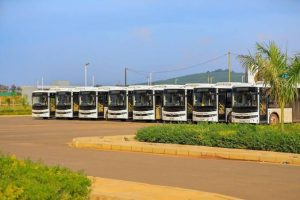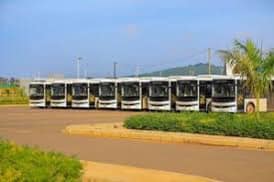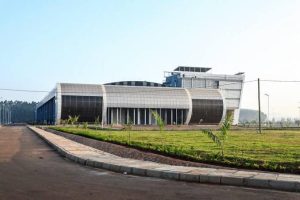
#OutToLunch: An effective public transport would shut out road fines complaints
By Denis Jjuuko On 21 November 2023, the Kampala Capital City Authority (KCCA) issued a procurement notice for “Consultancy Services for the Detailed Design Update of the Bus Rapid Transit System (BRT) for the Greater Kampala Metropolitan Area (GKMA)” after receiving “financing from the African Development Fund towards the cost of the Kampala City Roads Rehabilitation Project (KCRRP).” The notice further indicated that “the main objective of the assignment is to review and update the detailed designs for the BRT system that were prepared in 2014 to reflect current and expected travel needs in Greater Kampala Metropolitan Area (GKMA)”. That was probably the nth time such an advert had been published. Given our procurement bureaucracy and the speed at which we do things, probably the consultant has never been hired or has not gone very far in “reviewing and updating” the detailed designs. You will notice that in 2014 or 11 years ago, this work was done. And of course, it wasn’t implemented. During Jennifer Musisi Ssemakula’s tenure as executive director of KCCA, we were even promised cable cars. Many years later, not even a cable has been installed. Had all these plans been implemented many years ago, the government would not have been struggling to implement the so-called intelligent transport management system also known as the punitive road fines. A BRT system that works would have reduced traffic congestion on Kampala roads enabling motorists to drive within acceptable speed limits to reach their destination on time. One of the reasons people tend to speed is because they are catching up with time lost in traffic. Somebody who takes two hours to complete a 5-10km route that leads them to the Kampala Northern Bypass or the Entebbe Expressway will push the gas pedal once they get on any of those roads. They do so not because they are reckless but because they need to be somewhere at the right time. Government officials especially ministers understood this and many of them got themselves lead cars. That way they can manage the traffic gridlock in Kampala faster and reach their destinations on rare occasions on time! They know driving at 30kph is not practical without an effective public transport. Although a car is an ultimate dream for many Ugandans, the major reason people drive is because of the unreliability of public transport in Kampala. That is why during school holidays, many people park the cars and use public transport. There has always been an argument that Kampala roads are narrow to create BRT lanes and such. If you removed street parking, lanes would be created for buses and emergency vehicles. By emergency vehicles I mean emergency vehicles such as ambulances and fire trucks. Not everyone with a luxurious SUV. Spaces can easily be created on dual carriage roads where overpasses could be created for the BRT and even the light rail transit system. In fact, in many cities, there are sections where trains and buses use the same infrastructure. Toll stations would then be created so private cars entering some parts of the city are heavily charged thereby pushing people to use the BRT and other public transport means. Since there would not be street parking on some roads and there would not be a need to drive to the city, entrepreneurs would be encouraged to invest in public parking near stations where people can leave their cars when getting onto the BRT or trains. Or even in Kampala for those who insist to drive. Uganda would stop losing a lot of money in wasted working hours and improve Kampala’s air quality thereby reducing the cost of healthcare. In fact, many people will become healthier as they walk from their work places to the stations to catch a bus or train. Effective public transport is one of the ways to make a city modern. And it isn’t out of this world. Cities like Dar es Salaam have tried it and it is somewhat working. Uganda already has the buses at its Kiira Vehicle Plant in Jinja. Why not put them to use? Then after implementing this in Kampala, trains could be extended to other major cities. If we had trains to Kasese and Packwach a few years ago, why can’t we have them now? We usually claim that there is no money. If we can cut down on some of the excesses in public administration, we would be able to achieve these things easily. We can also issue infrastructure bonds and encourage Ugandans and others to participate in them. Eliminate corruption and briefcase companies from winning tenders and we are good to go. If the majority people used an effective public transport system, nobody would argue about excessive fines on Lugogo Bypass. The writer is a communication and visibility consultant. djjuuko@gmail.com


